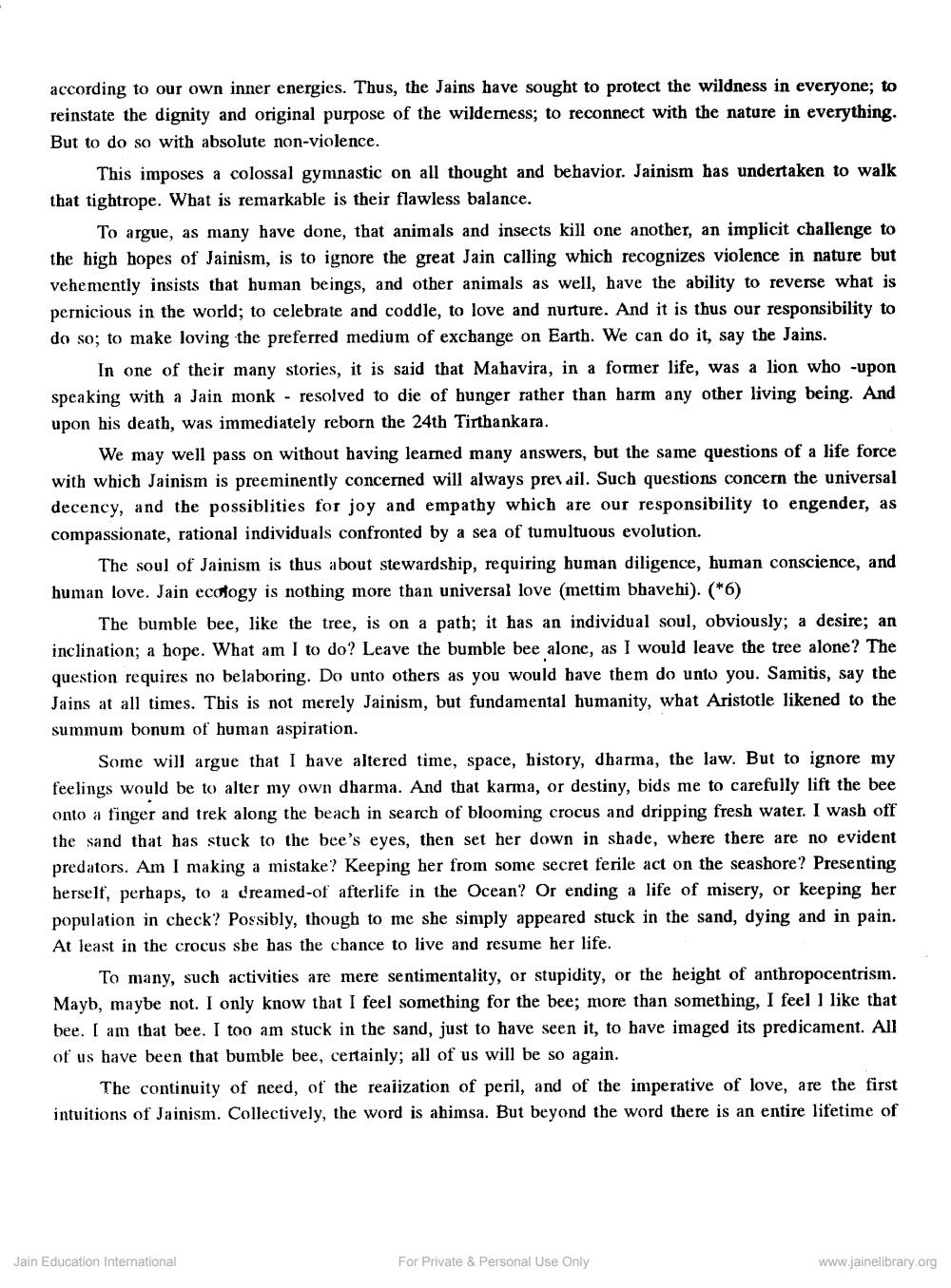________________
according to our own inner energies. Thus, the Jains have sought to protect the wildness in everyone; to reinstate the dignity and original purpose of the wilderness; to reconnect with the nature in everything. But to do so with absolute non-violence.
This imposes a colossal gymnastic on all thought and behavior. Jainism has undertaken to walk that tightrope. What is remarkable is their flawless balance.
To argue, as many have done, that animals and insects kill one another, an implicit challenge to the high hopes of Jainism, is to ignore the great Jain calling which recognizes violence in nature but vehemently insists that human beings, and other animals as well, have the ability to reverse what is pernicious in the world; to celebrate and coddle, to love and nurture. And it is thus our responsibility to do so; to make loving the preferred medium of exchange on Earth. We can do it, say the Jains.
In one of their many stories, it is said that Mahavira, in a former life, was a lion who -upon speaking with a Jain monk resolved to die of hunger rather than harm any other living being. And upon his death, was immediately reborn the 24th Tirthankara.
We may well pass on without having learned many answers, but the same questions of a life force with which Jainism is preeminently concerned will always prevail. Such questions concern the universal decency, and the possiblities for joy and empathy which are our responsibility to engender, as compassionate, rational individuals confronted by a sea of tumultuous evolution.
The soul of Jainism is thus about stewardship, requiring human diligence, human conscience, and human love. Jain ecology is nothing more than universal love (mettim bhavehi). (6)
The bumble bee, like the tree, is on a path; it has an individual soul, obviously; a desire; an inclination; a hope. What am I to do? Leave the bumble bee alone, as I would leave the tree alone? The question requires no belaboring. Do unto others as you would have them do unto you. Samitis, say the Jains at all times. This is not merely Jainism, but fundamental humanity, what Aristotle likened to the summum bonum of human aspiration.
Some will argue that I have altered time, space, history, dharma, the law. But to ignore my feelings would be to alter my own dharma. And that karma, or destiny, bids me to carefully lift the bee onto a finger and trek along the beach in search of blooming crocus and dripping fresh water. I wash off the sand that has stuck to the bee's eyes, then set her down in shade, where there are no evident predators. Am I making a mistake? Keeping her from some secret ferile act on the seashore? Presenting herself, perhaps, to a dreamed-of afterlife in the Ocean? Or ending a life of misery, or keeping her population in check? Possibly, though to me she simply appeared stuck in the sand, dying and in pain. At least in the crocus she has the chance to live and resume her life.
To many, such activities are mere sentimentality, or stupidity, or the height of anthropocentrism. Mayb, maybe not. I only know that I feel something for the bee; more than something, I feel I like that bee. I am that bee. I too am stuck in the sand, just to have seen it, to have imaged its predicament. All of us have been that bumble bee, certainly; all of us will be so again.
The continuity of need, of the realization of peril, and of the imperative of love, are the first intuitions of Jainism. Collectively, the word is ahimsa. But beyond the word there is an entire lifetime of
Jain Education International
For Private & Personal Use Only
www.jainelibrary.org




